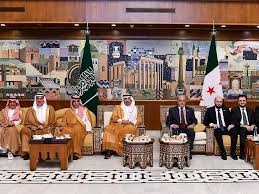In a significant move to support Syria’s post-war recovery, Saudi Arabia has signed investment agreements valued at $5 billion. This initiative marks a pivotal step in rebuilding Syria’s war-torn infrastructure and economy.
Background of the Agreement
The agreements were formalized during a high-level forum held in Damascus, attended by over 150 Saudi investors and officials. Led by Saudi Investment Minister Khalid Al-Falih, the delegation engaged in discussions with Syrian counterparts to explore cooperation opportunities and sign agreements that enhance sustainable development and serve the interests of both nations.
Key Sectors of Investment
The signed deals encompass vital and strategic sectors, including:
- Real Estate and Infrastructure: Development of housing projects and reconstruction of war-damaged areas.
- Telecommunications and IT: Expansion of digital infrastructure and services.
- Transportation and Logistics: Improvement of transportation networks to facilitate trade and mobility.
- Industry and Energy: Establishment of new industrial facilities and energy projects.
- Tourism and Trade: Development of tourism sites and enhancement of trade relations.
These investments aim to revitalize Syria’s economy and create job opportunities for its citizens.
Economic and Employment Impact
The implementation of these projects is expected to generate approximately 50,000 direct jobs and an additional 150,000 indirect jobs. This employment boost will contribute to reducing unemployment rates and improving living standards in the affected regions.
Diplomatic Significance
This collaboration underscores Saudi Arabia’s commitment to supporting Syria’s transitional government, led by President Ahmad al-Sharaa, who assumed power following the fall of Bashar al-Assad. The investment deals reflect a strengthening of bilateral ties and a shared vision for regional stability and prosperity.
Challenges and Outlook
While these investments represent a positive development, Syria faces significant challenges in its reconstruction efforts. The United Nations estimates that rebuilding the country will require at least $250 billion. However, with continued international support and strategic partnerships, there is hope for a gradual recovery and a return to stability.
Saudi Arabia Syria Investment 2025 Brings Hope for Reconstruction
Saudi Arabia Syria investment 2025 is expected to play a transformative role in rebuilding communities that have been devastated by years of conflict. Beyond economic growth, the deals symbolize a renewed commitment to regional cooperation and long-term stability in the Middle East. By channeling financial resources into key sectors, Saudi Arabia is supporting Syria in laying the foundations for sustainable development.

Focus on Infrastructure and Housing
One of the primary areas of investment is infrastructure, particularly the reconstruction of damaged roads, bridges, and public facilities. Many urban areas in Syria have been heavily affected by conflict, leaving thousands without access to essential services. Through these projects, Saudi investment aims to improve transportation networks and restore critical public amenities. Housing projects are also a major component, with plans to construct thousands of affordable homes for displaced families. These initiatives are expected to improve the quality of life for Syrians and promote social stability in recovering communities.
Encouraging Private Sector Growth
Saudi Arabia Syria investment 2025 also focuses on supporting the private sector. Investments in industry, agriculture, and small-scale enterprises are expected to stimulate local economies. By providing capital and expertise, Saudi Arabia is helping Syrian businesses recover, create jobs, and foster entrepreneurship. This approach encourages self-sufficiency and reduces dependence on foreign aid in the long run.
Technological and Energy Initiatives
Technology and energy are other key pillars of the agreements. Saudi investments aim to modernize Syria’s electricity grid, expand renewable energy projects, and introduce innovative IT solutions. These initiatives are crucial for improving efficiency, reducing energy shortages, and supporting industrial and commercial growth.
Social and Humanitarian Benefits
Beyond economic benefits, the investment deals carry significant social impact. Restoring infrastructure, housing, and employment opportunities will help families rebuild their lives. Access to improved education, healthcare, and community facilities is expected to follow, fostering a sense of hope and stability among Syrians.
Conclusion
Saudi Arabia Syria investment 2025 represents a comprehensive approach to post-war recovery. By combining economic, social, and technological initiatives, these deals aim to rebuild not only Syria’s infrastructure but also the lives of millions of its citizens. This partnership demonstrates the potential of regional collaboration in fostering peace, stability, and long-term prosperity.
Do follow us: Instagram
Read More: Tashas Group’s Bold Expansion Transforms UAE Suburban Dining Scene



